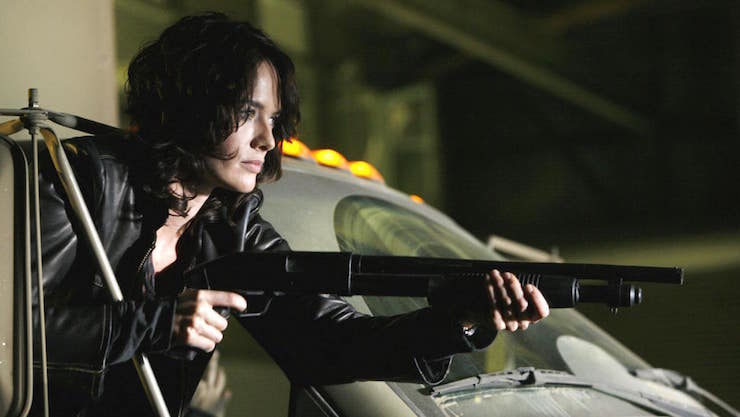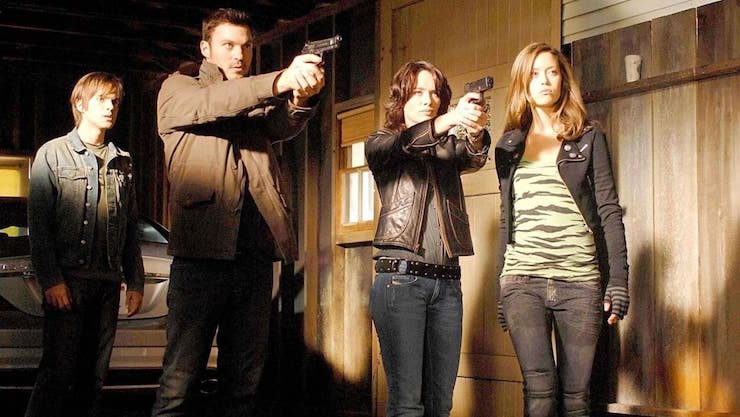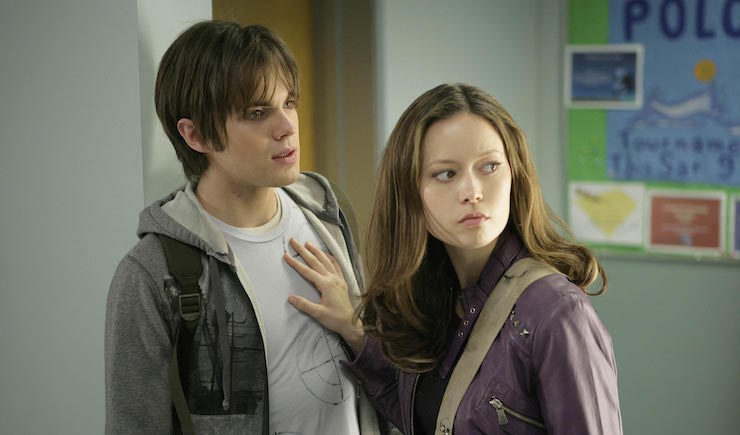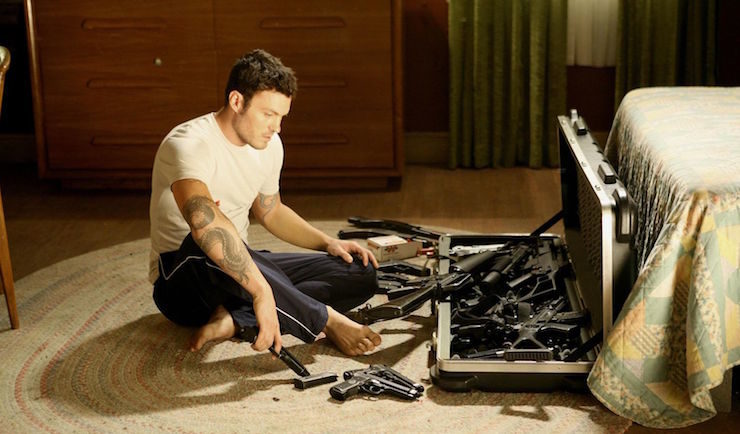James Cameron has formally announced that a new Terminator movie is in development. Given that he basically lives on Pandora with the Na’vi now, Cameron will be producing while Deadpool’s Tim Miller is in the director’s chair. Arnold Schwarzenegger will return and, more interestingly, so will Linda Hamilton.
That’s…good news? Probably? Maybe? Perhaps? After three increasingly ambitious and, unfortunately, increasingly incoherent sequels the Terminator series is looking a lot like it’s way past its obsolescence date. Cameron’s vague mutterings about Arnie playing the person the T-800’s physical form was based on don’t exactly help matters, either. Schwarzenegger getting to play out the Terminator version of Logan could be interesting, but—unless the film is building to a very definitive ending, rather than another sequel—there’s not really much point.
Besides, the best continuation of the Terminator saga has already happened on TV.
Terminator: The Sarah Connor Chronicles ran for two seasons from 2008 to 2009. It starred a post-Heroes Thomas Dekker as John Connor, a pre-Game of Thrones Lena Headey as Sarah, and a post-Firefly Summer Glau as Cameron, a terminator sent back to protect John. So far, so familiar.
But what makes The Sarah Connor Chronicles work is how far it dug down into the central existential horror of the Terminator franchise’s premise. Jumping forward in time to 2007, Sarah, John, and Cameron find the present day riddled with elements of the temporal Cold War between Skynet and humanity. Resistance fighters with multiple agendas, Terminators dropped throughout history, and other various factions all competing for power, survival, and control of a future that was increasingly as mutable as the liquid metal of the T-1001.
It’s frequently brilliant, and a lot of the series’ strength is down to the cast. Headey’s pensive, driven Sarah, tormented by nightmares of the future and her predicted death from cancer, is a fantastic anchor for the show. This was exactly the Sarah we saw at the end of Judgment Day, a woman at peace with her past, and making peace with her future. She’s still driven, still deeply intimidating, but has a dark sense of gallows humor that helps to power the show’s emotional engine.
Elsewhere in the cast, Dekker does excellent work as John. His performance also draws on the movies, focused on the John Connor we met in Terminator 3. One of the very few elements of that movie that truly works is Nick Stahl’s take on John. His arc—from not being sure of his purpose or place to becoming the leader the future needs—is the exact one Dekker follows and, with the extra space and time afforded by TV, the character development works far better, here. There’s a moment at the end of series highlight “Goodbye To All That” where John breaks down as he realizes almost everyone he knows or will ever know will eventually die for him or on his orders, and it’s heartrending. It’s also absolutely a characterization in line with the gobby little asshole that Edward Furlong played and the dazed, lost young man that Stahl depicted. This is John becoming John and fulfilling his destiny, even as he and his deeply weird family try and stop Skynet from doing the exact same thing.
The new elements the show brought to the mix were where it really soars, however. Richard T. Jones as FBI Agent Ellison becomes a focal point for the other side of the show’s apocalyptic algebra: a normal man exposed to incontrovertible proof of something impossible, struggling to balance that knowledge with both his rationality and his faith. Jones is great in the role, equal parts Tommy Lee Jones in The Fugitive and Joe Don Baker’s Darius Jedburgh in Edge of Darkness, and Ellison was given some of the show’s meatiest, most interesting material.
The same can be said, I was pleasantly surprised to find, about Summer Glau. I’ve never been a big fan of Glau’s work, but her turn as Cameron is easily some of her best. The episodes “Allison from Palmdale” and “Self Made Man” in particular really dig into the idea of the Terminators as machines that could learn. Cameron’s struggle to cope with the memories of the woman she was based on in “Allison from Palmdale” are fascinating to see, while the latter episode is a weirdly sweet, charming bottle episode that explains what Terminators do instead of sleep. Bolstered by a fantastic guest turn from Todd Stashwick as a Terminator who arrived early and ended up as the embodiment of the American dream, “Self Made Man” is a profoundly eccentric hour of TV anchored by Glau’s careful, precision performance. Likewise, Garrett Dillahunt as the recurring T-888 villain Cromartie does an excellent job of exploring the stresses these pure, perfect machines are undergo when their programming collides with their experience.
But for me, the true breakout character of the show is Derek Reece. Played by Brian Austin Green, Derek is Kyle’s older brother who was sent to the past for very different reasons. What could have been a terrible plotline clicks from the moment he first arrives, and Derek completes the ethical framework in which John is being raised. Sarah is his moral and psychological rock, Cameron knows what he can do—and (to a lesser extent) would do, and Derek is the constant reminder of every soldier he’d send out to die. “Goodbye To All That” explores this in tremendous detail and to great success, but it’s a thread that runs through the entire show: John Connor as a man out of his own time, existing in a psychological and ethical null space between what’s expected of him, what he’s done, and what he should do. He’s a living one-two point, around which strange things continually occur.
The show’s real genius, however, is in how it explores the consequences not just of time travel but of time passing. A Season 2 plot saw Stephanie Jacobsen appear as Jesse Flores, a Resistance fighter from the future and Derek’s former partner. In another highlight episode, “Complications,” Jesse captures a man she claims tortured Derek almost to death in the future.
Except that Derek has no memory of that ever happening. And his Judgment Day took place on a different day than Jesse’s.
Jesse, along with Shirley Manson’s Catherine Weaver, embodies not just the idea of Judgment Day as a fluid point, but the future itself being unstable—not set, but fluid. Skynet designed Terminators that were too self-aware, humans fled to the past with no intention of saving the future, and the right course of action became obscured not by the fog of war but by the fog of uncertainty, conflicting agendas, and personal choice. Echoing John’s message to Sarah, via Kyle Reece, way back in the first movie, our heroes must fight to change the future, striving for an outcome far more complex and interesting than the binary mutual annihilation of the original timeline.
That desire to continually explore the most complex, most personal consequences of the story’s premise is the show’s greatest strength and, ultimately, what doomed it. It’s refusal to take the easy way out, or to fall back on “Terminator of the week” plotlines meant that that the series only lasted 31 episodes. However, history has vindicated its approach again and again. Almost a decade later, The Sarah Connor Chronicles stands as the single successful continuation of the Terminator series since the original two movies, and set a high benchmark that nothing that’s followed it has come close to meeting. Combining thoughtful, intellectual science fiction with action, consequence, character and a bone-dry sense of humor, it’s a hidden gem that’s perfect for rediscovery. Terminator 6 has a lot to live up to.
Alasdair Stuart is a freelancer writer, RPG writer and podcaster. He owns Escape Artists, who publish the short fiction podcasts Escape Pod, Pseudopod, Podcastle, Cast of Wonders, and the magazine Mothership Zeta. He blogs enthusiastically about pop culture, cooking and exercise at Alasdairstuart.com, and tweets @AlasdairStuart.













